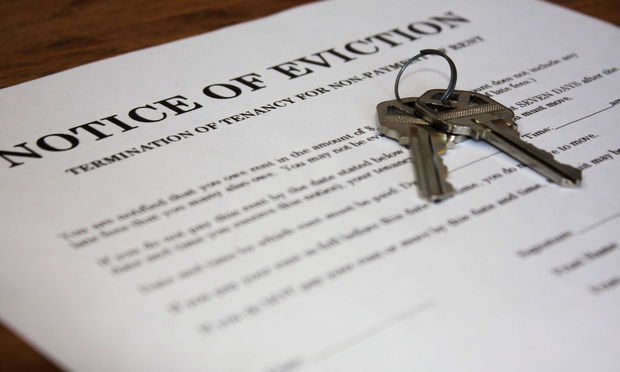As Rent Reforms Get Courtroom Shakeout, Judge Shuts Door on Overcharge Defense
According to the lawyers for the landlord in the case, the ruling is significant because it provides "clarity" and "guidance" from a judge on the rent overcharge issue at a time when many tenants may seek to renew their fights.
August 27, 2019 at 11:33 AM
5 minute read
 Eviction notice/credit: bigstock.
Eviction notice/credit: bigstock.
In what may be one of the first decisions addressing a tenant's move to seek relief under newly enacted, statewide pro-tenant rent reforms, a New York City judge has knocked down a tenant's effort to revive—by pointing to a newly expanded statute of limitations—his previous affirmative defense of rent overcharge in an eviction action.
According to the lawyers for the landlord in the case, the ruling by city Civil/Housing Court Judge Frances Ortiz is significant—at least in relation to oft-raised rent-overcharge claims made in landlord-tenant disputes—because it provides "clarity" and "guidance" from a judge on the rent overcharge issue at a time when many tenants may seek to renew their fights.
Most pointedly, as the attorneys at Rosenberg & Estis say they understand Ortiz's decision, it means that a tenant overcharge claim already dismissed may not be relitigated even if that claim is still within the newly expanded six-year look-back, or statute of limitations, period, because the changes made to the statutory rent overcharge provisions only pertain to still-pending or newly brought claims.
Before the changes, there was a four-year look-back period.
"What the clarity does," said Neil Dwork, a Rosenberg & Estis member and a lawyer for landlord 400 E58 Owner LLC in the action, "is it will cut down on additional motion practice and litigation that the court isn't going to consider."
Dwork and Rosenberg & Estis associate Laura Davidov added during a phone interview Monday that it's expected that under the new reforms, many tenants will seek to "relitigate" certain issues.
But Davidov added in a postinterview email that Ortiz's ruling "provides guidance to practitioners as to how the new law is being applied to previously adjudicated overcharge claims. It makes clear that the new law does not provide tenants with an opportunity to re-litigate overcharge claims which have previously been determined."
The new overcharge look-back period—six years instead of four—is just one of the many sweeping reforms made part of the Housing Stability and Tenant Protection Act of 2019, which was signed into law in June and made effective June 14.
The act and the series of changes aimed at bolstering tenant protections, especially for lower-income residents and those living in rent-stabilized dwellings, have been touted by state congressional leaders as the strongest tenant protections in state history.
They include doing away with allowing residential units to be removed from rent stabilization when the cost of rent, or a tenant's income, passed specific thresholds, for example.
And the changes have apparently so upset some landlords and building owners that in July a coalition of them filed a lawsuit in the U.S. District Court for the Eastern District of New York aimed at striking down the state's rent control laws.
In the "non-payment dwelling" eviction before Ortiz, the judge found herself addressing a motion for leave to renew her previous dismissal of an overcharge defense that had been lodged by Samuel Herrnson, a Manhattan building tenant facing eviction.
Herrnson, according to the judge, had based his July 17 renewal motion in part on "a change in the law," referring specifically to the Housing Stability and Tenant Protection Act of 2019, that would allegedly thereby change Ortiz's decision to grant the petitioner 400 E58 Owner LLC's motion to dismiss and summary judgment on the affirmative defense of rent overcharge, among other defenses dismissed. (Herrnson also pointed to new facts and arguments in his motion, pointing to an alleged fraud from years ago by management, but Ortiz also tossed aside that alleged renewal reason.)
Herrnson, according to Dwork and court documents, had been represented by counsel in the action but is now pro se. He could not be reached for comment Monday.
Addressing Herrnson's change-in-the-law argument in her Aug. 7 decision, Ortiz wrote, in part, that "the changes to the rent overcharge provisions in the Housing Stability and Tenant Protection Act of 2019 relate to claims pending or filed after the effective day of the statute (June 14, 2019)." And she then pointed out that "this court dismissed the 'rent overcharge' issue in a decision dated June 13, 2019," just a day before the statute took effect.
Near the conclusion of her decision, Ortiz also wrote that Herrnson's "motion to renew based on Housing Stability and Tenant Protection Act of 2019 is denied," and, as part of her reasoning, then pointed out that "it has been more than four years from the July 2001 deregulation and time to challenge for a FMRA," or fair market rent appeal.
In 2018, Herrnson was sued for eviction by 400 E58 Owner based on alleged nonpayment, according to Dwork and a court document.
Said Dwork on Monday of Ortiz's denial of the renewal motion by Herrnson, "Essentially, what the judge is saying is that you don't get a second bite at the apple now" on the rent overcharge issue.
This content has been archived. It is available through our partners, LexisNexis® and Bloomberg Law.
To view this content, please continue to their sites.
Not a Lexis Subscriber?
Subscribe Now
Not a Bloomberg Law Subscriber?
Subscribe Now
NOT FOR REPRINT
© 2025 ALM Global, LLC, All Rights Reserved. Request academic re-use from www.copyright.com. All other uses, submit a request to [email protected]. For more information visit Asset & Logo Licensing.
You Might Like
View All
Unit Owners Sued Board for Failure To Maintain Adequate Fire Insurance: This Week in Scott Mollen’s Realty Law Digest



Judgment of Partition and Sale Vacated for Failure To Comply With Heirs Act: This Week in Scott Mollen’s Realty Law Digest
Trending Stories
- 1Thursday Newspaper
- 2Public Notices/Calendars
- 3Judicial Ethics Opinion 24-117
- 4Rejuvenation of a Sharp Employer Non-Compete Tool: Delaware Supreme Court Reinvigorates the Employee Choice Doctrine
- 5Mastering Litigation in New York’s Commercial Division Part V, Leave It to the Experts: Expert Discovery in the New York Commercial Division
Who Got The Work
J. Brugh Lower of Gibbons has entered an appearance for industrial equipment supplier Devco Corporation in a pending trademark infringement lawsuit. The suit, accusing the defendant of selling knock-off Graco products, was filed Dec. 18 in New Jersey District Court by Rivkin Radler on behalf of Graco Inc. and Graco Minnesota. The case, assigned to U.S. District Judge Zahid N. Quraishi, is 3:24-cv-11294, Graco Inc. et al v. Devco Corporation.
Who Got The Work
Rebecca Maller-Stein and Kent A. Yalowitz of Arnold & Porter Kaye Scholer have entered their appearances for Hanaco Venture Capital and its executives, Lior Prosor and David Frankel, in a pending securities lawsuit. The action, filed on Dec. 24 in New York Southern District Court by Zell, Aron & Co. on behalf of Goldeneye Advisors, accuses the defendants of negligently and fraudulently managing the plaintiff's $1 million investment. The case, assigned to U.S. District Judge Vernon S. Broderick, is 1:24-cv-09918, Goldeneye Advisors, LLC v. Hanaco Venture Capital, Ltd. et al.
Who Got The Work
Attorneys from A&O Shearman has stepped in as defense counsel for Toronto-Dominion Bank and other defendants in a pending securities class action. The suit, filed Dec. 11 in New York Southern District Court by Bleichmar Fonti & Auld, accuses the defendants of concealing the bank's 'pervasive' deficiencies in regards to its compliance with the Bank Secrecy Act and the quality of its anti-money laundering controls. The case, assigned to U.S. District Judge Arun Subramanian, is 1:24-cv-09445, Gonzalez v. The Toronto-Dominion Bank et al.
Who Got The Work
Crown Castle International, a Pennsylvania company providing shared communications infrastructure, has turned to Luke D. Wolf of Gordon Rees Scully Mansukhani to fend off a pending breach-of-contract lawsuit. The court action, filed Nov. 25 in Michigan Eastern District Court by Hooper Hathaway PC on behalf of The Town Residences LLC, accuses Crown Castle of failing to transfer approximately $30,000 in utility payments from T-Mobile in breach of a roof-top lease and assignment agreement. The case, assigned to U.S. District Judge Susan K. Declercq, is 2:24-cv-13131, The Town Residences LLC v. T-Mobile US, Inc. et al.
Who Got The Work
Wilfred P. Coronato and Daniel M. Schwartz of McCarter & English have stepped in as defense counsel to Electrolux Home Products Inc. in a pending product liability lawsuit. The court action, filed Nov. 26 in New York Eastern District Court by Poulos Lopiccolo PC and Nagel Rice LLP on behalf of David Stern, alleges that the defendant's refrigerators’ drawers and shelving repeatedly break and fall apart within months after purchase. The case, assigned to U.S. District Judge Joan M. Azrack, is 2:24-cv-08204, Stern v. Electrolux Home Products, Inc.
Featured Firms
Law Offices of Gary Martin Hays & Associates, P.C.
(470) 294-1674
Law Offices of Mark E. Salomone
(857) 444-6468
Smith & Hassler
(713) 739-1250






